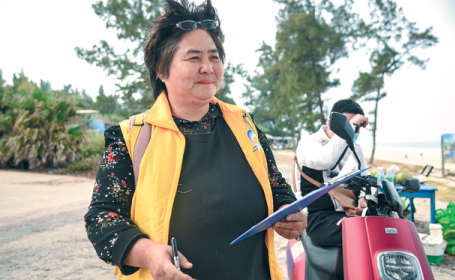Marine protection makes waves for former reporter

Xu Hai'ou oversees a zero-waste campaign on Weizhou Island, Guangxi Zhuang autonomous region, in April last year. CHINA DAILY
Xu Hai'ou has spent most of her life promoting environmental protection work in Beihai, a coastal city in the Guangxi Zhuang autonomous region, by cleaning beaches, protecting migrant birds and recycling kitchen waste.
Though her family originally comes from the eastern province of Shandong, the 60-year-old was raised in Guangxi and moved to Beihai for work at age 23, directly after graduating from college. Before she retired, she worked as a reporter for the Guangxi Daily Media Group, a news outlet in the region. In her free time, she became involved in voluntary work.
"In initially, in the 1990s, I helped impoverished children in Guangxi's rural areas obtain financial aid from donors in Hong Kong, and set up my own NGO in 2004. At the time, it was Beihai's only nonprofit social organization involved in volunteer work," she said. "It's very enjoyable to do this charity work and I have made many friends through it."
She said her NGO focuses on environmental protection work and organizes a range of voluntary activities, including cleaning up beaches, and protecting mangrove forests and migratory birds.
In 2008, the organization joined a marine life protection event supported by the central government, the UN Environment Programme and the Global Environmental Facility.
Xu and her colleagues at the association arranged a number of voluntary events such as raising awareness of marine biodiversity among local residents and students, and beach-cleaning activities to help promote understanding of the need to protect marine animals and plants.
In addition to marine affairs, the protection of migrant birds is also important to Xu and her colleagues. In 2010, they joined another program supported by UNEP and GEF, which focused on research into migratory birds. "Beihai is one of the important way stations for migratory birds, but they face dangers from poachers. On our journeys to clean the birds' habitats, we've raised awareness of migratory birds among local people and visitors," Xu said.
"We occasionally encountered dangerous situations when we tried to drive away poachers, but thankfully we received help from the forestry public security department, which sent officers to keep us company during our protection activities."
She said that her association also received financial support and professional guidance from international organizations and the SEE Foundation, a Chinese NGO focused on charitable activities.
"They sent experts to deliver lectures and provide training: for example, how to remove trammel nets (which are used to trap birds), which was of great help to us at the time," she said.
"Undertaking voluntary activities or charitable work has become my mission, and I want to contribute my own efforts to the nation's environmental protection work, even if they only produce a small improvement. However, protecting the environment is very hard work, which can't be done by a single person. I sometimes feel like my ability falls short of my wishes."
According to Xu, her NGO is currently promoting the classification of waste in Beihai and recycling kitchen waste into compost. "We have mature technologies, but still face difficulties in promoting the program because many residents lack awareness of environmental protection. We hope the government can figure out better ways of managing the garbage after we classify it to make full use of this 'waste'."
